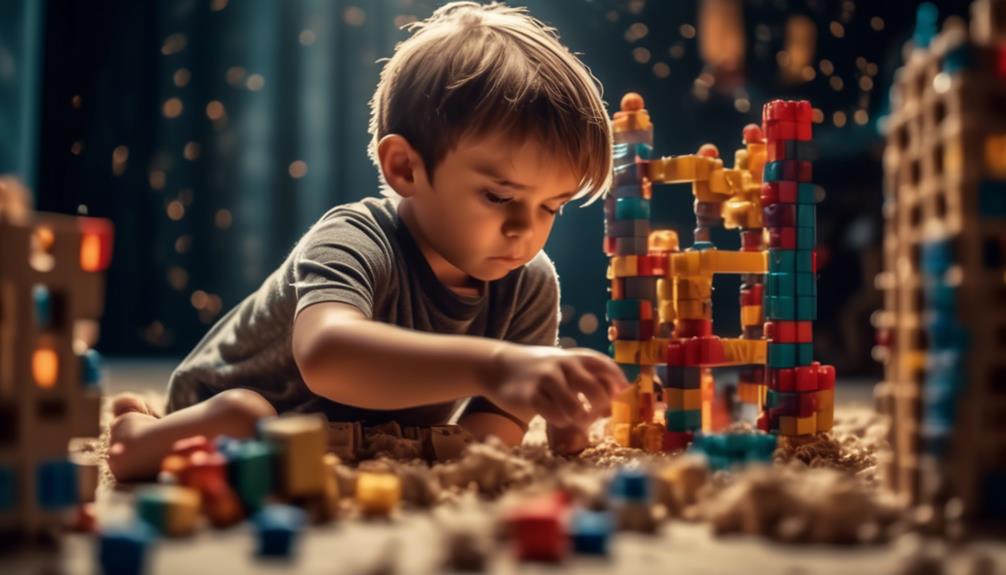The Role of Play in Learning Self-Regulation Skills

Play is a vital tool for developing self-regulation skills. It enhances one's ability to control thoughts, emotions, and actions. Play also serves as a catalyst for growth and self-discovery.
The Importance of Self-Regulation Skills
Self-regulation skills are crucial for individuals to effectively manage their emotions, thoughts, and behaviors, allowing them to navigate through life's challenges with resilience and adaptability. And when it comes to developing self-discipline and self-regulation skills in children, play plays a significant role.
Play isn't just a form of entertainment; it's a powerful tool for learning and growth. Through play, children are able to explore their world, experiment with new ideas, and develop essential life skills. It's during play that children learn to regulate their emotions, control their impulses, and practice self-discipline.
When children engage in play, they're given the opportunity to make choices, solve problems, and negotiate with others. These activities require self-regulation skills such as patience, impulse control, and emotional management. For example, when playing a game with others, children must learn to take turns, follow rules, and control their emotions when faced with challenges or setbacks.
Understanding the Benefits of Play
As you explore the topic of understanding the benefits of play, you'll discover the vital connection between play and self-control.
Play provides children with an opportunity to learn and practice self-regulation skills, such as managing their emotions, controlling their impulses, and maintaining focus.
Play and Self-Control
Engaging in play has the power to cultivate important self-control skills, allowing you to navigate life's challenges with greater ease and resilience. Play provides opportunities to practice impulse control, the ability to resist immediate urges and make thoughtful decisions. When you engage in play, you encounter situations that require you to think before acting, teaching you to pause, consider consequences, and exercise self-discipline.
Through play, you also enhance your attention span, the ability to focus on a task or activity for an extended period. By engaging in play, you train your mind to concentrate, ignore distractions, and stay engaged in the present moment.
These self-control skills developed through play will serve you well in various aspects of life, helping you make better decisions, regulate emotions, and maintain a calm and composed demeanor.
Play-Based Learning Strategies
To truly understand the benefits of play, one must embrace the power of play-based learning strategies. Play-based teaching is an interactive approach that encourages children to learn through play, fostering their self-regulation skills in the process.
Here are three key benefits of play-based learning strategies:
- Active Engagement: By incorporating interactive play into the learning process, children become active participants in their own education. This hands-on approach helps them develop a sense of autonomy and ownership over their learning journey.
- Problem-Solving Abilities: Play-based learning encourages children to explore, experiment, and solve problems in a safe and supportive environment. Through imaginative play, they learn to think critically, make decisions, and find creative solutions to challenges.
- Social and Emotional Development: Play-based teaching provides opportunities for children to interact with their peers, developing important social and emotional skills. They learn to negotiate, cooperate, share, and empathize, fostering positive relationships and emotional intelligence.
Enhancing Self-Control Through Play
Through the power of play, you can cultivate and strengthen your self-control skills, allowing you to navigate life's challenges with grace and resilience. Play-based interventions offer a unique and effective approach to enhancing self-control, as they provide a safe and enjoyable environment for practicing self-regulation techniques.
Consider the following table, which highlights some ways in which different types of play can contribute to the development of self-control skills:
| Type of Play | Benefits |
|---|---|
| Pretend play | Encourages impulse control and emotional regulation as children take on different roles and scenarios. |
| Outdoor play | Promotes self-control through activities that require patience, such as waiting for a turn on the swing or playing cooperative games. |
| Board games | Enhances self-control by teaching children to follow rules, take turns, and manage frustration when faced with setbacks. |
| Construction play | Develops patience, problem-solving skills, and the ability to delay gratification as children work towards building complex structures. |
| Physical play | Supports self-control by helping children manage their energy levels, practice self-regulation of movements, and follow rules in games. |
Developing Emotional Regulation Abilities
By honing your emotional regulation abilities, you can navigate the complexities of your emotions with grace and resilience. Developing self-awareness is the first step towards regulating your emotions effectively. Take the time to reflect on your thoughts and feelings, and become aware of any patterns or triggers that may lead to emotional imbalance. This self-awareness allows you to identify your emotional state and understand the underlying causes.
Once you have developed self-awareness, there are various strategies you can employ to regulate your emotions:
- Practice deep breathing exercises: Deep breaths can help calm your nervous system and bring you back to a state of equilibrium.
- Engage in physical activity: Exercise releases endorphins, which can improve your mood and help regulate your emotions.
- Seek support from others: Talking to a trusted friend or family member can provide a fresh perspective and help you process your emotions.
Regulating emotions is a lifelong journey, and it requires patience and practice. Remember to be kind to yourself as you navigate through the highs and lows of your emotions. With dedication and perseverance, you can develop emotional regulation abilities that will serve you well in both your personal and professional life.
Problem-Solving Skills and Play
As you continue on your journey of developing emotional regulation abilities, it's important to recognize the significant role that problem-solving skills and play can play in enhancing your overall well-being and resilience.
Problem-solving techniques are essential tools that allow you to navigate through the challenges and obstacles that life presents. By engaging in play, you can foster a mindset of creativity and exploration, which are crucial for developing effective problem-solving skills.
Through play, you're able to approach problems with a sense of curiosity and experimentation. This mindset encourages you to think outside the box and explore alternative solutions. Creative problem-solving involves embracing innovative approaches and adapting to new situations. By incorporating play into your problem-solving process, you can tap into your natural ability to think creatively and find unique solutions.
Play also provides a safe and supportive environment for you to practice problem-solving techniques. Whether it's through games, puzzles, or role-playing activities, play allows you to engage in structured activities that challenge your problem-solving abilities. These activities provide opportunities for you to develop strategies, test hypotheses, and learn from both success and failure.
Play as a Tool for Cognitive Development
Now, let's explore the incredible power of play as a tool for cognitive development.
Engaging in play not only brings joy and fun, but it also offers numerous benefits for your cognitive growth.
Through play, you have the opportunity to enhance your problem-solving skills, boost your creativity, and strengthen your memory and attention span.
Moreover, play has a profound impact on brain development, fostering neural connections and promoting overall cognitive functioning.
Benefits of Play
Engaging in play fosters cognitive development, allowing you to enhance your problem-solving skills and expand your cognitive abilities. Play serves as a powerful tool for improving focus and promoting creativity.
Here are some key benefits of play in terms of cognitive development:
- Enhanced problem-solving skills: Through play, you can engage in activities that require you to think critically and find solutions to challenges. This helps you develop your problem-solving skills, enabling you to approach problems with a creative and analytical mindset.
- Improved focus: Play provides an opportunity to immerse yourself in a task or activity, requiring concentration and focus. This helps you strengthen your ability to concentrate for longer periods and enhances your overall focus and attention span.
- Expanded cognitive abilities: Play encourages you to explore, experiment, and engage in imaginative thinking. This stimulates your brain and allows for the development of new neural connections, resulting in expanded cognitive abilities such as improved memory, language skills, and spatial awareness.
Cognitive Growth Through Play
Through play, you can unlock the door to cognitive growth and harness the power of your mind's potential.
Cognitive development is essential for expanding your knowledge, understanding, and thinking skills, and play provides a unique opportunity to foster this growth.
Play-based approaches offer a rich environment for exploration, problem-solving, and critical thinking.
As you engage in play, your brain is actively involved, making connections, and strengthening neural pathways.
Whether it's building with blocks, solving puzzles, or engaging in imaginative play, each activity stimulates different areas of your brain, promoting cognitive development.
By incorporating play into your learning experiences, you can enhance your memory, attention, and reasoning abilities.
Play isn't just about having fun; it's a powerful tool for cognitive growth, enabling you to reach your full intellectual potential.
Embrace play and witness the transformative impact it can have on your cognitive abilities.
Play and Brain Development
As you continue to explore the power of play, you'll discover how it serves as a catalyst for brain development and fosters cognitive growth. Play-based learning strategies have a profound impact on the development of the brain, shaping its structure and function.
Consider the following ways in which play contributes to brain development:
- Neuroplasticity: Play stimulates the brain's ability to form and reorganize neural connections, promoting flexibility and adaptability.
- Executive Functions: Engaging in play enhances executive functions such as attention, problem-solving, and decision-making, strengthening the brain's cognitive abilities.
- Language Acquisition: Play provides a rich environment for language development, as children engage in imaginative play and interact with others, expanding vocabulary and communication skills.
Through play, the brain is constantly challenged and stimulated, leading to the growth and refinement of cognitive processes.
Embracing play as a tool for brain development allows us to nurture the potential of individuals and promote their holistic growth.
Social Play and Self-Regulation
Social play fosters the development of self-regulation skills by promoting collaboration, empathy, and emotional control. Engaging in social interaction during play allows children to learn how to work together, take turns, and negotiate in order to achieve a common goal. Through cooperative play, children develop a sense of empathy as they learn to understand and respond to the emotions and needs of others.
In the context of social play, children are faced with various challenges that require them to regulate their emotions and impulses. They learn to control their excitement and frustration, as well as manage conflict and resolve disagreements peacefully. This process helps children develop emotional control and resilience, essential skills that are crucial for healthy social relationships.
Furthermore, social play provides opportunities for children to practice self-regulation in a safe and supportive environment. They can experiment with different strategies for managing their emotions and behavior, and learn from the consequences of their actions. This experience helps them develop self-awareness and self-control, enabling them to make better choices and navigate social situations more effectively.
Incorporating Play in Everyday Learning
By incorporating play in everyday learning, you can further enhance children's self-regulation skills while providing them with enjoyable and interactive educational experiences.
Creative play and sensory play are two powerful tools that you can utilize to make learning a truly immersive and engaging experience.
- Creative play: Encourage children to engage in imaginative play where they can freely express their thoughts and ideas. This could involve storytelling, role-playing, or even creating their own artwork. By allowing children to explore their creativity, you're helping them develop their problem-solving skills, decision-making abilities, and self-expression.
- Sensory play: Incorporate activities that stimulate the senses, such as sand or water play, sensory bins, or even cooking experiments. These types of play experiences provide children with opportunities to explore different textures, smells, tastes, and sounds. By engaging their senses, you're helping them develop their ability to regulate their emotions, focus their attention, and make connections between different sensory inputs.
- Outdoor play: Take learning outside and encourage children to explore the natural world. Whether it's through nature walks, gardening, or building with natural materials, outdoor play not only promotes physical development but also fosters curiosity, problem-solving skills, and a sense of wonder about the world around them.
Incorporating play in everyday learning not only makes education more enjoyable but also helps children develop essential self-regulation skills that will benefit them throughout their lives. So go ahead, embrace play, and watch as children thrive in their learning journey.
Frequently Asked Questions
How Can Play Help Children Develop Self-Regulation Skills?
Play helps you develop self-regulation skills by allowing you to explore boundaries, make choices, and practice controlling your actions and emotions. It also enhances social and emotional development, teaching empathy and cooperation.
What Are Some Examples of Play Activities That Promote Self-Control?
Engaging in play activities that promote self-control can include games like Simon Says or Red Light, Green Light, where you practice following rules and regulating your impulses. These activities help develop important self-regulation skills.
Can Play Alone Be Sufficient for Children to Develop Emotional Regulation Abilities?
You might be surprised, but play alone may not be sufficient for children to develop emotional regulation abilities. While it has its benefits, the impact of social interaction and the role of adult guidance in fostering self-regulation through play cannot be underestimated.
How Does Play Contribute to the Development of Problem-Solving Skills?
Play contributes to the development of problem-solving skills by fostering creativity and innovation. Through imaginative play, children can explore different scenarios, think critically, and come up with creative solutions. This benefits their cognitive development and helps them become better problem solvers.
What Are Some Strategies for Incorporating Play Into Everyday Learning Activities?
To incorporate play into everyday learning activities, try using games, puzzles, and interactive activities. These strategies engage your child's imagination and foster a love for learning while developing important self-regulation skills.











